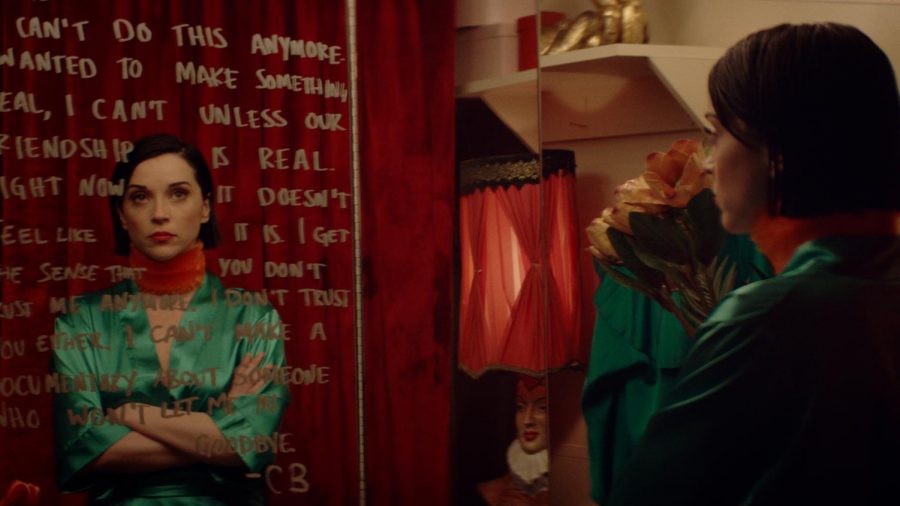Review: ‘The Nowhere Inn’ is a trippy exploration of persona
Recording artist St. Vincent and Carrie Brownstein of “Portlandia” team up for a beguiling yet frustrating mockumentary that explores the role of the modern performer.
“The Nowhere Inn” is a mockumentary starring St. Vincent and Carrie Brownstein that was released on Sept. 17. The film is an experimental look at the role of the modern performer. (Image courtesy of IFC Films)
October 4, 2021
Warning: the 2021 mockumentary “The Nowhere Inn” is a little weird. Directed by Bill Benz and written by and starring Carrie Brownstein and rock musician Annie Clark, who performs as St. Vincent, as exaggerated versions of themselves, “The Nowhere Inn” is a kaleidoscopic fiction in which two women attempt to retrospectively analyze their careers but end up tearing each other apart at the seams. This exploration is done, or rather undone, by Brownstein’s offer to make a documentary about St. Vincent’s real-life 2017 “MASSEDUCTION” tour as a distraction from her recently rejected pilot and ailing father. The film makes it clear that this documentary was never actually finished, so “The Nowhere Inn” ended up becoming an in-depth catalogue of what went awry.
Brownstein begins the project within a project by filming St. Vincent backstage at her first show. She quickly finds out that St. Vincent — known just as Annie offstage — is much more mellow than her electric onstage persona, as she spends most of her time playing board games and espousing the virtues of fresh beets. This bothers Brownstein. A lot. So much so, in fact, that she explicitly tells Annie how boring she thinks Annie is compared to St. Vincent: “Why can’t you be her all the time?”
This comment strikes a nerve with the singer. Afterward, St. Vincent stares at herself in the mirror in anguish. Suddenly, she’s basked in neon red lighting and all reservation disappears — Annie Clark is gone. The plot spirals from there as the performer devolves into a stereotypical erratic diva. St. Vincent starts demanding to be formally introduced whenever entering a room, to reshoot every line to make sure it’s perfect and to wear her stage costumes at all times. With each outburst, it becomes harder to tell whether St. Vincent is performing this persona out of spite or if Annie’s truly losing herself, which Carrie finds both distressing and intriguing as she keeps the camera rolling.
Though this pseudo-rockstar behavior is a trope that audiences have seen before, St. Vincent and Carrie carefully reveal these patterns to be a subversion of the expectations put onto them as artists. We see these pressures manifest in scenes toward the beginning of the film, like when an acerbic music critic demands free tickets to St. Vincent’s concert and then complains about how rude the singer is while sitting in on dress rehearsal. Similarly, Carrie’s father occasionally checks in with her to both congratulate her on her first directing gig and remind her that this is a job he can finally boast about to his friends. Even the people closest to these women feel entitled to their time and energy simply because they’re performers. Therefore, both women have equal reasons to be insecure despite their onslaught of success. So when Brownstein snaps at her friend, St. Vincent has ammo to fire back — which she does by coldly neglecting her throughout her meltdown.
As rich as this premise may be, “The Nowhere Inn” actually predicates most of its impact on its aesthetics and influences. From Lynchian dream sequences of winding roads to dynamic concert footage scattered throughout the feature, each shot is more enticing than the last. Brownstein and Clark also pull out of the “Portlandia” handbook for some masterful sequences of absurd humor, including a bizarre detour through Texas Americana where St. Vincent adopts a fake family to pose in front of the camera, or when Carrie is forced to record St. Vincent and her girlfriend artificially writhing around in a hotel bed. St. Vincent remains apathetic and regal throughout the myriad of hijinks while Brownstein awkwardly leers in the corner, which is an infectious dynamic that may cement the two as the next best female comedy duo.
Unfortunately, this deconstruction of fame and female friendship starts to wither further into the runtime. A major narrative shortcoming is the film’s failure to establish who Brownstein and St. Vincent truly are outside of the madness. It’s stated throughout the film that St. Vincent is a very private person, and this mockumentary seemed like a way to retain autonomy while divulging honesty about her own life. However, we never actually get a picture of who St. Vincent is outside of being a musician or Brownstein’s disappointing muse. Brownstein also gets the short end of the stick, as her relationship with her father is only alluded to and never resolved. The film simply doesn’t have a center to hold onto as chaos ensues, thus becoming a parody of a subject the audience doesn’t understand.
Despite the lack of a finite conclusion, “The Nowhere Inn” is a brazen piece of experimentation that never dares to bore the viewer. It’s a disappointment that the St. Vincent and Carrie Brownstein characters that the two women wrote for themselves only feel like esoteric pawns within their more ambitious metacinematic experience. However, even though this might seem like a risky watch for audience members unfamiliar with Brownstein or Clark’s quirky oeuvres, seeing two creatives swing and thrash around this hard might be worth the trip.
A version of this article appeared in the October 4, 2021, e-print edition. Contact Isabella Armus at [email protected].

























































































































































